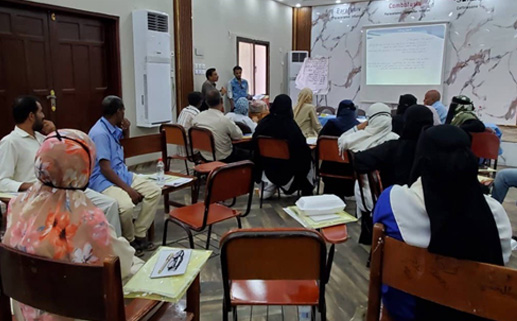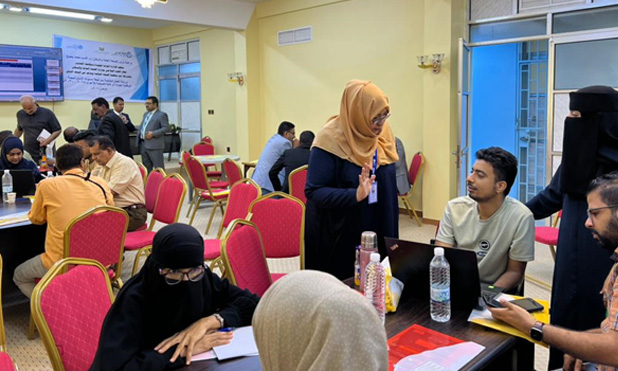 WHO hospital resilience capacity-building in the renovated training room at Al Jumhoria Hospital in Aden / WHO Yemen2 January 2025, Aden, Yemen – Skilled health workers are the backbone of strong health systems. Yet, in Yemen, the ongoing humanitarian crisis has severely disrupted their access to continuing professional development (CPD), threatening the delivery of essential healthcare services.
WHO hospital resilience capacity-building in the renovated training room at Al Jumhoria Hospital in Aden / WHO Yemen2 January 2025, Aden, Yemen – Skilled health workers are the backbone of strong health systems. Yet, in Yemen, the ongoing humanitarian crisis has severely disrupted their access to continuing professional development (CPD), threatening the delivery of essential healthcare services.
In partnership with the World Bank through the Emergency Human Capital Project (EHCP), WHO has launched extensive capacity-building initiatives, reaching thousands of health workers and introducing sustainable approaches that strengthen Yemen’s healthcare system.
WHO provides training, workshops and other capacity-building activities using WHO guidelines, technical packages and other tools. Because of the deteriorating public sector infrastructure, these activities have often taken place in hotels in major cities.
Recognizing the challenges faced by female health workers due to movement restrictions in some governorates, WHO adopted a decentralized training approach. For instance, in Hadramaut, Lahj and Marib, decentralization allowed female workers to attend CPD sessions locally, significantly increasing their participation.
During field visits to governorates, WHO staff members noted a willingness among health facility managers to invest in training venues, equipment and supplies for their staff, using their own budgets, prompting WHO to shift towards using training venues in health facilities. This resulted in immediate cost savings, in terms of venue hire and catering costs, and increased the opportunities for immediate practice and on-site support as part of the capacity-building activities. Field visits revealed a growing commitment among health facility managers to invest in training venues. WHO’s subsequent shift to facility-based training not only reduced costs but also enabled trainees to immediately apply their skills in real-world settings, fostering sustainable improvements.
 A national quality strategy stakeholder engagement workshop led by WHO in the recently renovated training room at the Central Public Health Laboratory in Aden / WHO YemenAfter 2 years of implementing this approach, other benefits are emerging. Health facility managers are increasingly investing in upgrading their training venues. The investments serve a dual purpose: they enable access to CPD for health workers, and strengthen partnerships with UN agencies and non-governmental organizations.
A national quality strategy stakeholder engagement workshop led by WHO in the recently renovated training room at the Central Public Health Laboratory in Aden / WHO YemenAfter 2 years of implementing this approach, other benefits are emerging. Health facility managers are increasingly investing in upgrading their training venues. The investments serve a dual purpose: they enable access to CPD for health workers, and strengthen partnerships with UN agencies and non-governmental organizations.
One result is the growing institutionalization of training programmes based on WHO guidelines and other high quality technical packages.
In 2022, WHO led a campaign to increase the number of health workers with skills in basic and advanced life support. As of 2024, this curriculum has been integrated into routine refresher training at several hospitals, including Marib and Sayoun general hospitals. WHO training courses on hospital care and management, quality of care and infection prevention and control have similarly been integrated in CPD curricula.
Across Yemen, health facilities have embraced WHO’s approach, investing in training infrastructure. From the Central Public Health Laboratory in Aden to Ibn Khaldoun Governorate Hospital in Lahj, these upgrades are transforming local capacity to deliver quality healthcare.
Moving forward, WHO, in partnership with the Ministry of Public Health and Population and health facility managers, will expand access to capacity-building for health workers. These efforts aim to ensure that Yemen’s healthcare system is equipped to meet the evolving needs of its population.
Learn more:
https://www.emro.who.int/yemen/news/who-advocacy-to-empower-female-health-workers-in-yemen.html
https://www.emro.who.int/yemen/news/strengthening-laboratory-capacities-in-yemen.html








